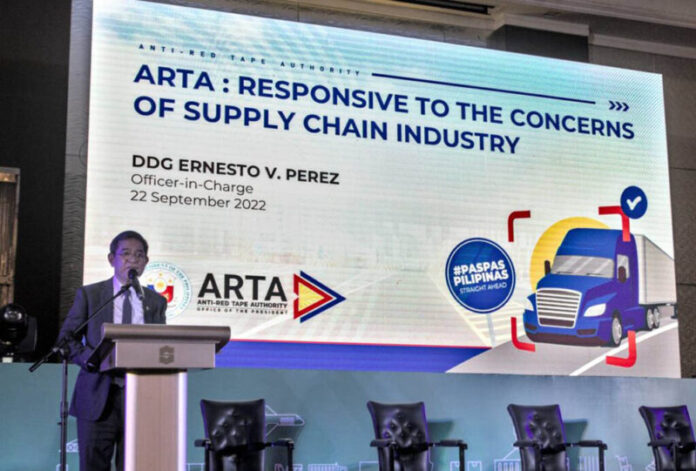
-
Various anti-red tape measures have been initiated to help address supply chain issues
-
Among these initiatives is a circular that prohibits collection of fees and taxes on the transport of goods and products, said Anti-Red Tape Measure Authority Undersecretary and OIC Ernesto Perez
-
Another measure is the Unified Logistics Pass, a unified QR code that facilitates the unhampered movement of trucks for hire delivering basic goods
Anti-Red Tape Authority (ARTA) Undersecretary and Officer-in-Charge Ernesto V. Perez highlighted how anti-red tape measures can help address issues faced by those in the supply chain sector.
“An efficient supply chain system will foster economic development, contribute to the country’s GDP, facilitate trade, and improve the country’s competitiveness,” ARTA Usec. Perez said in his keynote address at the recent Supply Chain Management Association of the Philippines (SCMAP) Supply Chain Conference.
“We are very supportive of the SCMAP’s projects, programs, and initiatives because we believe that our goals for the country are aligned. A strengthened supply chain management system will definitely contribute to a more competitive Philippines with an improved state of doing business,” he added.
According to Perez, among initiatives aimed at streamlining systems in the logistics and food and pharma sectors are Joint Memorandum Circular No. 2021-01 or the Omnibus Guidelines on Pass-Thru Fees. This issuance prohibits the collection of fees and taxes on the transport of goods and products.
The circular covers “charges for wharfage, tolls for bridges or otherwise, sticker fee, discharging fee, delivery fee, market fee, toll fee, entry fee, and/or mayor’s permit fee, or other taxes, fees, or charges in any form whatsoever upon such goods or merchandise.”
Another initiative is the Unified Logistics Pass (ULP), a unified Quick Response (QR) code that facilitates the unhampered movement of trucks for hire delivering basic goods and necessities.
The ULP aims to eliminate the separate pass-through stickers being required by economic zones, ports, and local government units (LGUs) to allow easier movement and ease port-entry restrictions for trucks.
ARTA recently turned over the system to the Land Transportation Franchising and Regulatory Board.
RELATED STORY: ARTA completes pilot testing of Unified Logistics Pass
Perez also talked about the Philippine Business Hub (PBH), formerly known as Central Business Portal, a single online platform for registering businesses.
The PBH, Perez said, reduced the number of days for registering businesses from 33 days and 13 steps to seven days and only one step.
He also mentioned the Pinas Bilis program, an end-to-end assistance for target national government agency and local government unit beneficiaries.
The program, in partnership with the Aboitiz Group, carries the tagline “Quick, Responsive, and Citizen-Centric Government Service.” It aims to streamline government processes of target NGAs and LGUs through empowerment activities and through the donation of hardware.
Other initiatives include the interconnection of government systems and data-sharing, implementation of the National Policy on Regulatory Management System, and completion of the government business process mapping.
Perez said all of ARTA’s efforts are in keeping with the directive of President Ferdinand Marcos, Jr. to improve services in the logistics sector. Marcos said this as he received complaints from agricultural product transporters and freight forwarders on the policies and checkpoints imposed by LGUs.




